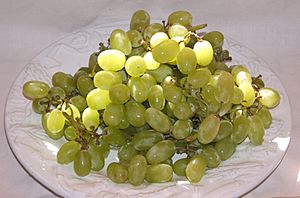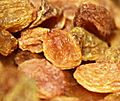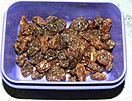Sultana (grape) facts for kids
Quick facts for kids Sultana |
|
|---|---|
| Grape (Vitis) | |

Sultana (Thompson Seedless) grapes
|
|
| Color of berry skin | Blanc |
| Species | Vitis vinifera |
| Also called | sultanina, Thompson Seedless, Lady de Coverly, oval-fruited Kishmish, İzmir üzümü |
| Notable regions | Aegean Region, Turkey |
The sultana is a popular type of grape that is pale green and shaped like an oval. It's special because it doesn't have any seeds! This grape is known by a few different names around the world. In the United States, it's often called Thompson Seedless. Other names include sultanina, Lady de Coverly, and oval-fruited Kishmish in places like Iraq and India.
In Turkey, it's called İzmir üzümü, which means "grape of İzmir," because it grows a lot in that area. People believe this grape first came from a region called Asia Minor, which was once part of the Ottoman Empire.
In some countries, especially those in the Commonwealth of Nations, the word sultana is used for the dried fruit made from these grapes. These dried grapes are often just called sultanas or sultanis.
Contents
History of the Sultana Grape
The sultana grape has a long history, especially in places like California, USA. Most of the sultana grapes grown in America are known as Thompson Seedless. This name comes from William Thompson, a grape farmer who helped grow this variety in California a long time ago. He is often given credit for bringing this grape to the area.
The US government even says that "sultana" and "Thompson Seedless" mean the same thing when talking about grapes. This type of grape is very important in California. In fact, about 97% of all raisins made in California in 2000 came from this one grape! It's the most widely planted grape variety there.
The Ottoman people brought the sultana grape to the island of Crete in the 1800s.
Sultana Raisins: A Sweet Treat
In the United States, many raisins, even the dark brown ones you usually see, are made from the Thompson Seedless grape. When people talk about "sultana" raisins, they usually mean the golden-colored dried grapes. These are also called "golden raisins."
Sometimes, the golden color comes from treating the grapes with something called sulfur dioxide. This is different from how they are traditionally dried. Also, many non-organic sultana grapes are treated with a plant hormone called gibberellin. This hormone helps the grapes grow bigger.
Other Uses for Sultana Grapes
The sultana grape is very useful because it can be used in three main ways. This is why it's sometimes called a "three-way grape."
- Eating Fresh: You can eat sultana grapes fresh as a table grape. They are sweet and delicious!
- Making Raisins: As we learned, they are perfect for making all kinds of raisins.
- Making Wine: Sultana grapes are also used to make white wine. This wine is known for being "sweet and mild."
In the United States, sultana grapes are often used to make a wine generally called "chablis." However, this is not the same as a true Chablis wine from France. In Europe, "Chablis" wine must be made from a different grape called Chardonnay and come from a specific region in France.
Because it's so useful, the Thompson Seedless is the most planted grape in California.
Where Sultana Grapes Go
Sultana grapes and raisins are used in many different places:
- Food Factories: They are used by companies that make baked goods and breakfast cereals.
- Grocery Stores: You can find them in supermarkets to buy and eat at home.
- Dairy Products: They are added to things like yogurt and ice cream.
- Dishes: They are great in salads and desserts.
Sultaniye Wines from Turkey
In Turkey, special wines called Sultaniye wines are made from sultana grapes. These wines are usually dry or semi-dry and are light-bodied. The grapes for these wines are mostly grown in areas like Denizli and Manisa, which are in the Aegean Region of Turkey.
Just like in other places, sultana grapes in Turkey are eaten fresh and dried into raisins. But they are also very important for making wine. Some wines from the Marmara Region of Turkey, made with Sultaniye grapes, are popular both in Turkey and around the world.
Images for kids
See also
 In Spanish: Sultanina para niños
In Spanish: Sultanina para niños
 | Bessie Coleman |
 | Spann Watson |
 | Jill E. Brown |
 | Sherman W. White |




